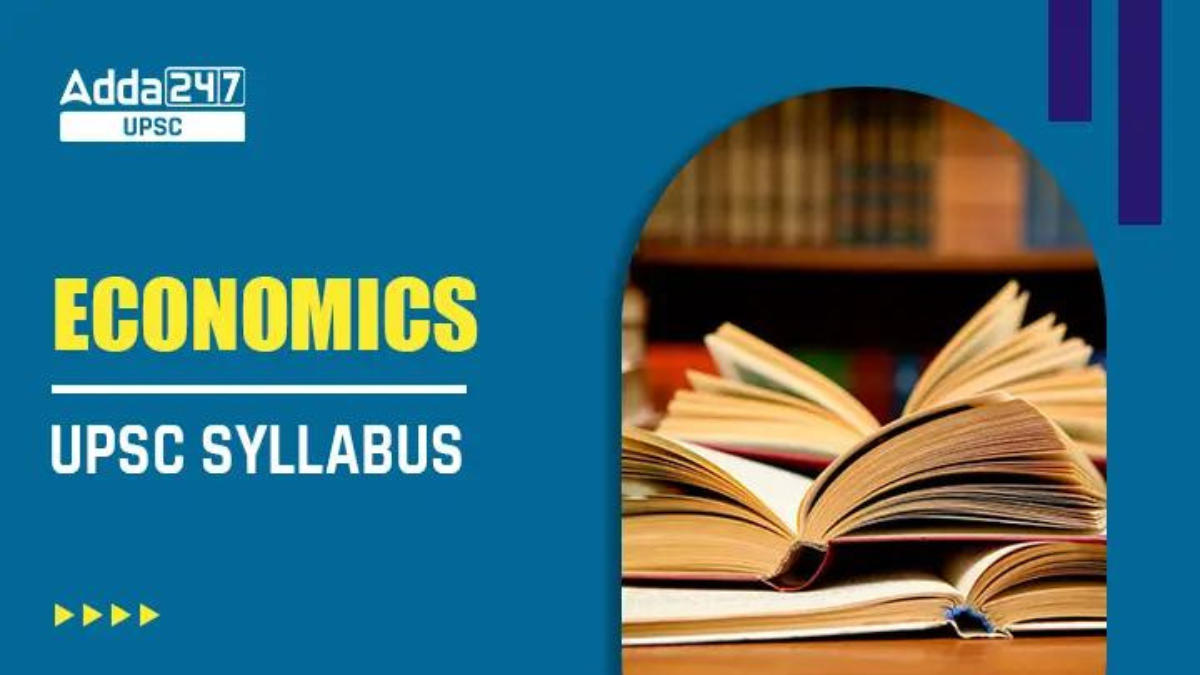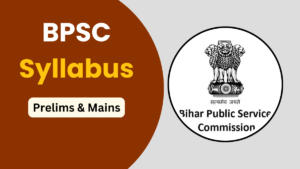Table of Contents
UPSC Economics Syllabus 2025
UPSC Economics Syllabus 2025 for Prelims
- Economic Growth and Development
- Poverty
- Inclusion
- Demographics
- Fiscal Policy
- Social issues
- trending news related to these subjects.
UPSC Economics Syllabus 2025 for Mains
Areas to Focus
- Indian Economy and issues relating to planning, mobilization of resources, development, growth, and employment.
- Inclusive growth
- Budgeting
- Major cropping patterns in different parts of the country, different types of irrigation, transport, and marketing of agricultural produce and issues and associated constraints
- Direct and indirect farm subsidies and minimum support prices; PDS- objectives, functioning, limitations; issues of buffer stocks, food security; economics of animal-rearing, Technology missions.
- Food processing and related industries
- Land reforms
- Effects of liberalization
- Infrastructure: energy, roads, ports, airports, and railways
- Investment models
UPSC Economics Syllabus for Paper 1
The below table outlines the UPSC economics syllabus for paper 1, covering various advanced topics in economics. It includes advanced microeconomics, focusing on price determination, alternative distribution theories, market structures, and welfare criteria.
| Section | Topics |
|---|---|
| Advanced Micro Economics | – Marshallian and Walrasian Approaches to Price Determination
– Alternative Distribution Theories: Ricardo, Kaldor, Kalecki – Market Structures: Monopolistic Competition, Duopoly, Oligopoly – Modern Welfare Criteria: Pareto Hicks & Scitovsky, Arrow’s Impossibility Theorem, A.K. Sen’s Social Welfare Function |
| Advanced Macro Economics | – Approaches to Employment, Income, and Interest Rate determination: Classical, Keynes (IS-LM) Curve, Neoclassical synthesis, and New Classical
– Theories of Interest Rate determination and Interest Rate Structure |
| Money – Banking and Finance | – Demand for and Supply of Money: Money Multiplier, Quantity Theory of Money (Fisher, Piquet, and Friedman), and Keynes’s Theory on Demand for Money
– Goals and Instruments of Monetary Management in Closed and Open Economies – Relationship between the Central Bank and the Treasury – Proposal for ceiling on the growth rate of money – Public Finance and its Role in Market Economy: Stabilization, resource allocation, distribution, and development – Sources of Government revenue, forms of Taxes and Subsidies, incidence and effects, limits to taxation, loans, crowding-out effects, and borrowing limits – Public Expenditure and its Effects |
| International Economics | – Old and New Theories of International Trade: Comparative Advantage, Terms of Trade and Offer Curve, Product Cycle and Strategic Trade Theories, Trade as an engine of growth and theories of underdevelopment in an open economy
– Forms of Protection: Tariff and quota – Balance of Payments Adjustments: Alternative Approaches<br>- Price versus income adjustments under fixed exchange rates – Theories of Policy Mix – Exchange rate adjustments under capital mobility – Floating Rates and their Implications for Developing Countries: Currency Boards – Trade Policy and Developing Countries – BOP adjustments and Policy Coordination in open economy macro-model – Speculative attacks – Trade Blocks and Monetary Unions – WTO: TRIMS, TRIPS, Domestic Measures, Different Rounds of WTO talks |
| Growth and Development | – Theories of growth: Harrod’s model, Lewis’s model of development with surplus labor, Balanced and Unbalanced growth, Human Capital and Economic Growth, Research and Development and Economic Growth
– Process of Economic Development of Less developed countries: Myrdal and Kuznets on economic development and structural change, Role of Agriculture in Economic Development of Less developed countries – Economic development and International Trade and Investment, Role of Multinationals – Planning and Economic Development: Changing role of Markets and Planning, Private-Public Partnership – Welfare indicators and measures of growth: Human Development Indices, Basic needs approach – Development and Environmental Sustainability: Renewable and Non-Renewable Resources, Environmental Degradation, Intergenerational equity development |
UPSC Economics Syllabus for Paper 2
The below table outlines the UPSC Economics Syllabus for Paper 2, focusing on the Indian economy both before and after independence. It covers significant topics such as the land system and commercialization of agriculture in the pre-independence era, along with the influence of British economic policies, including the drain theory and laissez-faire approach.
| Topics | |
|---|---|
| Indian Economy in the Pre-Independence Era | – Land System: Land ownership and tenancy, landlords, zamindars, British-introduced zamindari system.
– Agriculture: Commercialization, cultivation of cash crops like jute and cotton for export, market-oriented production. – Drain Theory: Concept by Dadabhai Naoroji, economic exploitation by British, heavy taxation, unfavorable trade balance. – Laissez-faire Theory: Minimal government intervention, policies favoring British interests, protectionist tariffs and trade restrictions. – Manufacturing and Transport: Development of jute and cotton industries, railways for goods transportation and economic integration. – Money and Credit Systems: Unified currency system, modern banking institutions, establishment of Reserve Bank of India. |
| Indian Economy After Independence | |
| 1. The Pre-Liberalization Era | – Contributions of Economists: Vakil (industrial planning), Gadgil (balanced regional development), V.K.R.V. Rao (Indian planning and public finance).
– Agriculture: Land reforms, Green Revolution, capital formation in agriculture. – Industry: Changes in industry composition and growth, role of public and private sectors, promotion of small-scale and cottage industries. – National and Per Capita Income: Analysis of patterns and trends, composition changes in different sectors. – Factors Determining National Income: Investment, technology, labor, infrastructure, poverty measures, trends in poverty and inequality. |
| 2. The Post-Liberalization Era | – New Economic Reforms and Agriculture: WTO agreements, impact on agricultural subsidies, prices, public distribution system, public expenditure on agricultural growth.
– New Economic Policy and Industry: Liberalization, privatization, disinvestments, role of foreign direct investment, multinationals. – New Economic Policy and Trade: Intellectual property rights, implications of TRIPS, TRIMS, GATS, new EXIM policy. – New Exchange Rate Regime: Partial and full convertibility, capital account convertibility. – New Economic Policy and Public Finance: Fiscal Responsibility Act, Twelfth Finance Commission, fiscal federalism, fiscal consolidation. – New Economic Policy and Monetary System: Role of RBI under the new regime. – Planning: Shift from central to indicative planning, the relationship between planning and markets, decentralized planning (73rd and 74th Constitutional amendments). – New Economic Policy and Employment: Employment and poverty, rural wages, employment generation, poverty alleviation schemes, New Rural Employment Guarantee Scheme. |
Important Books for UPSC Economy Syllabus 2025
The table provides a curated list of essential study materials for the UPSC Economics syllabus, encompassing both foundational and advanced resources.
| Resource Type | Title | Notes |
|---|---|---|
| NCERT Textbooks | NCERT Class XI – Indian Economic Development | Comprehensive understanding of Indian economy development |
| NCERT Class XII – Introductory Macroeconomics | Fundamentals of macroeconomics | |
| NCERT Class XII – Introductory Microeconomics (Selective Reading) | Basic principles of microeconomics | |
| Reference Books | Indian Economy by Ramesh Singh | In-depth analysis of Indian economy |
| Economic Development in India by I.C. Dhingra | Insights into India’s economic development | |
| Indian Economy by Datt and Sundharam | Detailed coverage of Indian economic issues | |
| Government Publications | Economic Survey and Budget | Latest economic data and analysis |
| India Year Book (Selected Reading) | Important government initiatives and updates |
How to prepare for UPSC Economics Mains?
From the previous year UPSC optional analysis it can be said that economics is a tough to score subject for UPSC optional so it requires a detailed strategy for the, which is discussed below and will help you in your preparation.
- Start with NCERT textbooks: Begin by reading the NCERT textbooks for economics from classes X, XI, and XII. These textbooks provide a solid foundation and cover the basic concepts of economics.
- Indian Economy by Ramesh Singh: This book is highly recommended for UPSC preparation. It covers various topics related to the Indian economy in detail and provides an in-depth analysis of economic concepts.
- Indian Economy by Sanjeev Verma: Another recommended book, it offers a comprehensive overview of the Indian economy, including important topics and current trends.
- Ministry websites: Visit the official websites of ministries related to water, power, finance, etc. These websites provide valuable information on government policies, schemes, and initiatives related to the economy.
- Economic Survey: The Economic Survey is an annual publication by the Ministry of Finance that presents a detailed analysis of India’s economy. Read the latest Economic Survey and focus on the key findings, trends, and policy recommendations.
- Budgets: Analyze the Union Budget and state budgets to understand the government’s fiscal policies, revenue generation, and expenditure priorities. Pay attention to key economic announcements and reforms.
- Administrative Reforms Commissions (ARC) Reports: Study the recommendations of 2nd ARC report related to economic reforms and governance. These reports provide insights into policy changes and administrative improvements.
- Press Information Bureau (PIB): Visit the PIB website regularly to stay updated on government policies, initiatives, and press releases related to the economy. Focus on economic news and policy announcements.
- Newspapers: Read newspapers like The Hindu, The Indian Express, and Business Standard to keep yourself updated on current economic affairs. Pay attention to articles and editorials covering economic issues, reforms, and policy debates.
- Previous year’s question papers: Solve previous years’ economics questions from the UPSC Mains GS Paper III. This will help you understand the question pattern, the depth of knowledge required, and the application of economic concepts in the context of current events.
- Remember, while studying economics, it is essential to have a clear understanding of both theoretical concepts and their practical application. Analyze the impact of government policies, initiatives, and economic reforms on different sectors of the economy. Develop a habit of critically evaluating economic issues and forming well-reasoned opinions.
- Regular revision, note-making, and practice through mock tests will further enhance your preparation. Additionally, it is advisable to join online forums or coaching programs to discuss economic concepts and clarify any doubts you may have and also for practice test, to improve your understanding of the subject.
| ALSO READ | |
| UPSC mains syllabus | UPSC Anthro syllabus |
| UPSC Zoology syllabus | UPSC philosophy syllabus |
| UPSC History Syllabus | UPSC Botany syllabus |
| UPSC Geography syllabus | UPSC English syllabus |



 APSC Syllabus 2025, Download Prelims And...
APSC Syllabus 2025, Download Prelims And...
 Punjab PCS Syllabus 2025, New Prelims an...
Punjab PCS Syllabus 2025, New Prelims an...
 BPSC Syllabus 2025 and Exam Pattern For ...
BPSC Syllabus 2025 and Exam Pattern For ...
